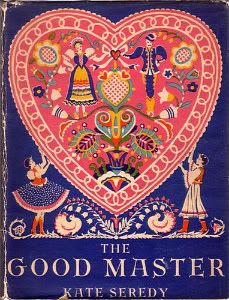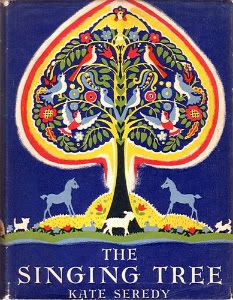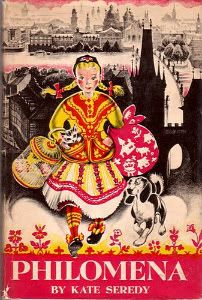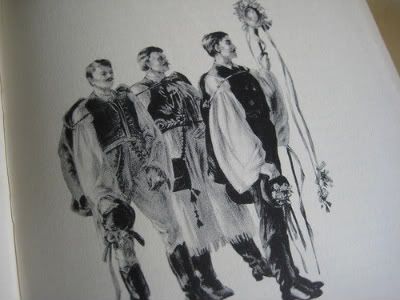Every spring, I reread two particular books---Kate Seredy's
The Good Master (1935) and
The Singing Tree (1939). These are two rightfully-acclaimed children's books that were each awarded the Newberry Honor award for excellence in children's literature.* I first read them back in elementary school, probably around the age of 7 or 8. They were favorite books of my mother, who bought me my own copies. Needless to say, I promptly fell in love with them and reread them every year.
Kate Seredy was born at the end of the 19th century in Hungary. She served as a nurse in WWI, then afterwords got an art degree and teaching certification. She moved to America and quickly made a name for herself by illustrating children's books. One of the editors she worked with suggested that she write a story herself, one about her experiences growing up in Hungary before the war.
The Good Master is that book, and won immediate acclaim.
The Singing Tree is the sequel.
(side note: I'm including the pictures for the original hardcovers, rather than the reprinted paperbacks I own. The original hardcovers are absolutely gorgeous and much more worthy of inclusion)

The Good Master is about two Hungarian children, cousins Jancsi (YAN-zsee) and Kate. Jancsi's father is the titular "good master", the primary landowner of the area. He has an enormous ranch on the Hungarian puszta (plains), and Jancsi, an only child, has grown up there. When he's ten years old, his cousin Kate from Budapest comes to live with the family. Jancsi and Kate have never met. Jancsi, who has never been to the city, imagines that Kate will be a delicate princess with ethereal beauty and manners. What he gets is a mischievous tomboy with dirty knees and a propensity for pranks. He realizes pretty quickly that this is much better than the princess he was hoping for---Kate ends up becoming his best friend and playmate. The book follows their adventures during the idyllic pre-war period, around 1912.
What I like best about
The Good Master is its depiction of Hungarian customs. Kate, having lived in the city her entire life, is only familiar with Western ways. Her new life in the countryside immerses her in the traditional ways of her people, and she learns all about Magyar culture. We see the traditions of Easter, of county fairs, of harvest and Christmas. We learn about life on the farm, about the importance of their way of life to the Magyar people. Through Kate's conversations with her uncle's shepherds, we hear several traditional Hungarian folk tales. This is a book that just brims with beauty.
A critic accused
The Good Master of lacking relevance, saying it failed on two levels. Firstly, that it depicts Kate as going from a girl who loves riding horses at the beginning of the book, to one who's happiest weaving and cooking by the end of the book. Clearly, this is an anti-feminist book. Secondly, that children today can't relate to it, that it's mawkish and sappy and outdated. My response to the first is this: yes, I'm sad when Kate grows up and has to leave off her tomboyish habits. It would have killed me, had I had a horse of my own, to have had to have given him up at a certain age. BUT. That's the way things were back then, and
The Good Master accurately depicts that. Saying we shouldn't read it because it's wrong is like saying we shouldn't read
Uncle Tom's Cabin because slavery is wrong. We learn about things by reading about them. When I read this book to my children someday, I'll use that particular plotline as a starting point for conversation. What was life like back then for girls? How is it different today? Why is it important that things have changed? And on the second matter, if children today can no longer appreciate sweet, old-fashioned books like
The Good Master, then I'm raising my children in the Yukon. I'm already disgusted enough by things like Bratz dolls and
Gossip Girl and I don't even HAVE kids yet. A book that shows ten year olds acting like ten year olds seems far more worthy to me than one where they act like streetwalkers and frat boys.
Sigh. Anyway, I absolutely adore this book and have so many happy memories of reading it throughout the years.
 The Singing Tree
The Singing Tree is a little more bittersweet than
The Good Master because it deals with the effects on WWI on Kate and Jancsi's lives. Both their fathers and most of the young men of the village leave to become soldiers. Kate's father is taken prisoner in Russia, Jancsi's is missing and presumed dead. Jancsi must take charge of the farm and become the Young Master, and the family, with their role of community leadership, takes in as many people as they can to help. A troop of Russian prisoners arrive to help with the farm work. A group of German children come to stay to get away from the fighting in Germany. While the war does not directly come to the farm, its effects are felt by the Nagy family in many different ways. It's a sober, sad, and yet ultimately moving depiction of the ending of one age and the beginning of another.
The Singing Tree is definitely meant for older readers than
The Good Master. In addition to war, the book also deals with topics such as anti-semitism, socialism, hatred and forgiveness. As with
The Good Master, I think this makes it an easy way to discuss such things with children. I especially like the fact that the book doesn't try to portray one side of the war as good and the other as bad---it simply says that war's awful no matter which side you're on. As somebody with ancestors on both sides of both WWI and WWII, I appreciate that neither side of my heritage is demonized.
After I reread the books last month, I decided I'd finally give some of Seredy's other books a try. The one that looked most appealing was this one:
 Philomena
Philomena is the story of a 13 year old girl from a tiny village in what's now the Czech Republic but was, at the time of the story, the Austro-Hungarian empire. The tradition in Philomena's villages is for girls, upon turning 13, to go to Prague to work as maidservants. By the time of their traditional four years there, they've learned everything they need to keep house, and return to their village as attractive candidates for marriage (yes, I can hear the feminists screaming from here).
Philomena's time in Prague, however, is complicated by her search for a missing aunt. It's a very comic story, somewhere in between a picture book and a chapter book, and more or less one long romp from beginning to end. Philomena's an appealing, likeable protagonist and the conclusion to her story and her search is satisfying and almost fairy-tale-like. Do I like it as much as
The Good Master and
The Singing Tree? No, but that may just be because I don't have the history with it that I do with the others. I don't know. It lacks the depth of the chapter books, but it is charming in its own right.
The best part of the three books are Kate Seredy's illustrations. She was primarily an artist and saw her stories merely as something to go with the art she created, rather than the other way around. I have such strong memories of the artwork from the
The Good Master and
The Singing Tree--it's beautiful, accessible, and instantly recognizable as hers. She makes a concerted effort to infuse her illustrations with Hungarian details, and that was the part that fascinated me the most as a child:

In the picture above, the three men are in traditional Hungarian dress. They are performing "the calling", the Hungarian tradition by which people are invited to a wedding. It's that kind of vernacular detail within the illustrations that I like the best, and Seredy's books are brimful of folk art and beauty. Her illustrations of the horses within the story (Father's Bator, Jancsi's Barsony, and Kate's Milky---and yes, I've remembered and loved those names all these years) are breathtaking and worthy of printing and framing. Its even occurred to me to have some of her folk-art illustrations transferred into needlework patterns. Nothing is beneath her notice as an illustrator; she makes everything beautiful, even the chapter headings.
Anyway, I adore Kate Seredy's work and intend her books to be a pivotal part of my children's library. They are just plain GOOD books. I suppose they're old-fashioned. They're certainly sweet books with happy endings (which apparently is a terrible thing these days). The highest acclaim I can give them is that they are books that uplift me---by the time I've finished reading them, I'm reminded about the beauty around me, about what's worth cherishing in life.
*Seredy won the Newberry award itself in 1937 for
The White Stag, a mythical retelling of the life of Attila the Hun and the settling of the Huns and Magyars in Hungary. Wikipedia describes the plot thusly:
For generations the tribes of Huns and Magyars had moved westward, obeying their Pagan Gods' orders to follow a White Stag to their promised homeland. They could see the White stag but could never catch it. I've never gotten around to reading this, but it's on my list of books to buy for my future children.



